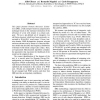Free Online Productivity Tools
i2Speak
i2Symbol
i2OCR
iTex2Img
iWeb2Print
iWeb2Shot
i2Type
iPdf2Split
iPdf2Merge
i2Bopomofo
i2Arabic
i2Style
i2Image
i2PDF
iLatex2Rtf
Sci2ools
115
click to vote
EMNLP
2004
2004
Unsupervised Domain Relevance Estimation for Word Sense Disambiguation
This paper presents Domain Relevance Estimation (DRE), a fully unsupervised text categorization technique based on the statistical estimation of the relevance of a text with respect to a certain category. We use a pre-defined set of categories (we call them domains) which have been previously associated to WORDNET word senses. Given a certain domain, DRE distinguishes between relevant and non-relevant texts by means of a Gaussian Mixture model that describes the frequency distribution of domain words inside a large-scale corpus. Then, an Expectation Maximization algorithm computes the parameters that maximize the likelihood of the model on the empirical data. The correct identification of the domain of the text is a crucial point for Domain Driven Disambiguation, an unsupervised Word Sense Disambiguation (WSD) methodology that makes use of only domain information. Therefore, DRE has been exploited and evaluated in the context of a WSD task. Results are comparable to those of state-oft...
Domain Relevance Estimation | EMNLP 2004 | EMNLP 2007 | Unsupervised Text Categorization | Word Sense |
Related Content
| Added | 30 Oct 2010 |
| Updated | 30 Oct 2010 |
| Type | Conference |
| Year | 2004 |
| Where | EMNLP |
| Authors | Alfio Massimiliano Gliozzo, Bernardo Magnini, Carlo Strapparava |
Comments (0)

